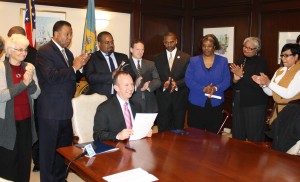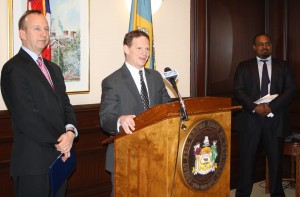Measure attacks current, potential designer drugs
DOVER – Synthetic drugs, popularly known as bath salts and other designer drugs would be made permanently illegal under legislation that will be introduced Tuesday by Sen. Bethany Hall-Long.
Hall-Long, D-Middletown, said Wednesday that her measure, Senate Bill 160, is undergoing its final review. After incidents involving the drug spiked during the late summer of 2011, Gov. Jack Markell ensured that the sale of bath salts were banned in the First State until the Legislature could enact a law to that effect upon reconvening. Secretary of State Jeffrey Bullock issued an Emergency Rule making illegal the sale or use of three chemicals commonly used to produce bath salts. The rule expires later this month.
If it is approved by lawmakers and signed by the governor, Hall-Long’s bill not only makes the ban permanent, but expands the current order to rework the legal definition of designer drugs to cover synthetic versions of drugs now on the state’s list of controlled substances in an effort to combat development of new recreational drugs.
“We all applauded the quick actions taken by Gov. Markell to address the problem as it was starting to explode here in Delaware,” Hall-Long said. “The General Assembly needs to move quickly and decisively to let the public know that selling bath salts and developing new, potentially dangerous drugs won’t be tolerated here and I’m confident that we’ll have this bill on the governor’s desk as quickly as possible.”
Markell said he was pleased the General Assembly is following up on the temporary ban.
“We took the first step of banning these dangerous drugs last fall under an emergency rule because we saw so many lives being ruined. Law enforcement and first responders made clear to us the violence, sickness and suicidal behavior they were seeing first hand from users and the danger these drugs posed,” Markell said. “I was encouraged by the strong and immediate support legislative leaders offered for the emergency ban. The legislature can now act to make these drugs permanently illegal.”
In its current form, Hall-Long’s proposal would make possession of the drugs a misdemeanor, however, people found guilty of possession with intent to distribute the drug could face up to eight years in prison and would face mandatory jail terms and up to 25 years in prison if found guilty of possession or possession with intent to distribute and factors, such as prior offenses, resisting arrest or committing a drug crime near a school or park are involved.
Biden praised Hall-Long for quickly addressing the issue and including language attacking the development of new designer drugs in the future.
“‘Bath salts’ and other designer drugs are poisonous substances that have devastating effects on abusers, their families, and neighborhoods up and down our state and they have no place on our streets,” Biden said. “I applaud Sen. Hall-Long for working quickly to develop this legislation which ensures that current and future versions of these dangerous drugs are illegal.”
Secretary of State Jeffrey Bullock likewise praised Hall-Long and her fellow lawmakers for taking up the issue so quickly.
“I thank Sen. Hall-Long and other members of the General Assembly for the urgency with which they are addressing this issue by proposing legislation to permanently outlaw ‘bath salts’ in Delaware,” said Bullock.
Rep. Rebecca Walker, in her job as an emergency room nurse at Christiana Hospital, has seen the effects bath salts have had on people and worked with the Attorney General’s office and Hall-Long to draft legislation permanently banning the substance.
“This phenomenon popped up last year and quickly became a daily problem in all three counties,” said Walker, D-Middletown. “People under the influence of these bath salts are so out-of-control and violent that they’ve injured nurses and EMS providers, making it difficult to provide the necessary treatment. My biggest concern is for members of the community who may be violently attacked. Permanently banning this dangerous designer drug is an important step in protecting Delawareans.”
Becky K. agreed. Becky in August had to escape a close friend in her pickup truck as he attacked her while he was on bath salts. The event, she said, finally made him realize where the drugs were taking him. Since then, he has received treatment.
“Bath salts made him a complete psychopath and paranoid. He was convinced my parents had installed cameras to watch his every move,” said Becky, whose last name was withheld for her protection. “The day he hit bottom, we were in my pickup truck when he attacked me. I then hit the gas to get away. As soon as I got away, I called the police because I didn’t want to leave him out there alone. I wanted him to get the help he needed to get his life back and, thank God he has gotten that help.”
Hall-Long was joined at a press conference announcing the legislation by Walker, Bullock, Biden, Deputy Safety and Homeland Security Secretary Elizabeth Olsen, Health and Social Services Secretary Rita Landgraf, Col. Robert Coupe, superintendent of the Delaware State Police, Dover Police Chief James Hosfelt, New Castle County Police Chief, Col. W. Scott McLaren who predicted the new law will bolster the ability of police around the state to deal with bath salts.
“This much-needed new law will help eradicate this deadly substance, and make it more difficult to sell, purchase and possess. This “drug” has been a scourge since it hit the shelves in our stores here in Delaware,” McLaren said. “Many police officers, Emergency Medical Services personnel and emergency room staff have been assaulted by people under the influence of this drug over the last year since its popularity has increased. Merchants should be warned that law enforcement officers will make arrests on the spot if a violation is found.”
Hosfelt, an early and vocal advocate of making bath salts illegal, thanked Markell for the executive order and Hall-Long for her efforts to make the ban permanent.
“The use of these designer drugs placed a significant strain on the Dover Police Department and other law enforcement agencies as well,” he said. “This legislation will provide the tools necessary to prohibit any future use or sale of these drugs.”
Besides police and elected officials, Hall-Long was joined by several people who, like Walker, also have had first-hand experiences with people who have used the drugs. Cheryl Flowers, a nurse in the emergency room at Kent General Hospital, said users who have come through the ER there require a lot more attention than most patients.
“I’ve seen a lot of people come through the unit on a lot of different drugs, but I’ve never seen anything quite like people on bath salts. They tend to require a lot more resources than other patients,” she said. “Because of the way they’re marketed, we tend to get a lot of younger patients, as well as people who have used cocaine and heroin that are taking bath salts because they can receive a more intense, euphoric high.”
But, she said, the drug also can make permanent changes in a person’s brain chemistry and functions.
“When they’re getting high,” she said, “most of the people using this drug aren’t aware of the risk of permanent injury that they’re running … The executive order has had worked. We’re seeing fewer cases, but people are still coming in and we need this law to make bath salts illegal permanently.”
Dr. Craig Hochstein, medical director of Bayhealth’s emergency department, agreed calling on legislators to make the ban permanent.
“I would like to let legislators know what a huge impact this ban) has had. Our Emergency Department went from having several of these patients a week to zero within just a couple of days of this ban going into effect,” Hochstein said. “This has been a tremendous win for public health and safety.”
Landgraff said her department has seen evidence of the drug and its effects and pledged her department’s support of the bill.
“In emergency rooms across the state, we have seen the danger that bath salts present to the people who abuse this designer drug and to those they come in contact with while under the influence of it,” said Landgraf. “We will work with other state agencies, Sen. Hall-Long and her colleagues in the General Assembly to protect public health by making the state’s ban on this dangerous stimulant permanent. And we will continue to help families whose loved ones abuse this drug find treatment options in the community.”
Rep. Brad Bennett said his office received numerous calls from residents concerned about the effects of bath salts and began looking into banning the substance statewide.
“Kent General Hospital was inundated with hundreds of bath salts-related emergency cases last year. This has become an epidemic throughout the whole state,” said Bennett, D-Dover South. “Our most important job as legislators is to protect the public, which is what we are doing by introducing this bill. I thank everyone for their hard work and cooperation on this legislation and hope it is passed and signed into law quickly.”


